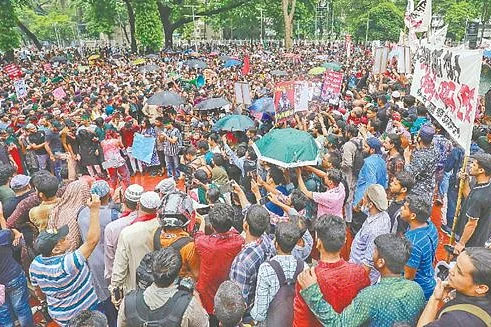People fear ghosts because they’ve never seen them. They’ve heard that ghosts are terrifying entities. If ghosts really existed and roamed around the market during the day, snapping the necks of a few people here and there, the public wouldn’t be as scared.
The fear would dissipate. People would then unite to find a way to get rid of the ghosts to save their necks.
Guns and power are like ghosts. They need to be kept hidden. The public needs to be subtly reminded, “Beware! The gun is there!”
If people know or can guess that someone powerful always carries a gun at their waist, they will fear that person. If they see that the person never takes out the hidden gun or shows off their power unnecessarily, the gun and power remain a terrifying mystery to them.
Without the unnecessary display of power and guns, fear can be mixed with respect, even reverence.
However, if the gun is used excessively and bullets are fired frequently, the public’s fear disappears. Initially, people may be shocked by sudden gunfire, but that shock quickly fades. The fear goes away. In its place, anger and a desire for protest and revenge take root.
This phenomenon was observed in the student movement. The guns and pistols on the police’s waists were not only drawn but also fired indiscriminately.
Bullets consumed everyone, from women standing on their balconies to children in their father’s arms. Videos circulated on social media showing law enforcement officers firing, including the shooting of Abu Saeed with his arms outstretched. The news of teenagers and young adults losing their eyes to pellet guns shocked, stunned, and terrified people across the country, except for those blindly loyal to their party. Doctors were even frightened by the influx of young gunshot victims in hospitals.
But that fear evaporated like camphor. Even yesterday, Friday, protesters in various parts of the country were shot at and hit with sound grenades. Many protesters were injured, and some were killed. Yet, there are no signs of fear among the protesters.
A few days ago, when the internet “disappeared” on its own, plunging the country into an information blackout, and TV channels were only showing trivial news like bumper crops of lemons in Bhurungamari, clashes were occurring between the protesters and various government forces (though ‘clashes’ may not be the right term here, as it implies a fight between two equal forces).
During the protests, there was vandalism, arson, and destruction. Lethal bullets and other deadly weapons were used to suppress the people’s anger. The scenes of gunfire on protesters, as seen in videos posted on social media, were beyond our imagination. The entire nation seemed terrified, stepping back in disbelief and fear.
But then, from somewhere, everyone seemed to gain courage. Yesterday, at the National Press Club, Shaheed Minar, and Shahbagh areas, I observed the student protesters, looking for signs of fear or panic. What I saw in their eyes was a determination to tear everything down. “Such courage that fear no longer grips them… no longer grips them. The pale face of fear seemed unfamiliar.”
A month ago, slogans that would have been unimaginable to shout on the streets are now being loudly and sharply voiced. The police and BDR, who had indiscriminately fired on protesters a few days ago, were faced with fearless protesters yesterday.
It seemed as if they were saying in unison, “If you kill me, I will spread like a flame in every earthen lamp in Bengal; I will not perish. I will return year after year from the soil as a green promise. I will not perish.”
Now, when you see the protesters on the streets, you will find sadness, pain, anxiety, anger, rage, and fury in their eyes, but you will not find fear. Because the gun has come out of the pocket. The mystique and fear surrounding the gun’s killing power were shattered with each fired bullet. Seeing so many bullet-riddled bodies, the layer of fear in the public’s mind has peeled away.
It is now clear that people no longer have the same fear of the police. Protesters, especially, are no longer afraid of the Chhatra League or Jubo League.
The way we have seen helmet-wearing thugs beat protesters and send them home over the past few years, I think that will now be very difficult. Because the general public’s fear has been broken.
In the past 15 years, the Awami League has never seemed so disconnected from the people.
Yesterday, the Minister of Posts, Telecommunications, and Information Technology, Zunaid Ahmed Palak, said at an event in his area that many Awami League leaders and workers who have received various benefits through him are now staying silent. Some are even avoiding his calls. This is a dangerous message for the Awami League.
Many of those who are now protesting against the government were staunch supporters of the Awami League until a month ago.
I personally know many people who, even before this movement, looked at the government’s countless injustices with a ‘forgiving eye.’ They would brush off thousands of wrongdoings with a dismissive ‘Oh, forget it.’
I now see many of them standing by the protesting students and demanding the government’s resignation.
People who once couldn’t tolerate the BNP and Jamaat are now harshly criticizing the government.
This situation did not develop overnight. Over the past 15 years, the government has built a syndicate at every level. More people who bought positions with money were given places in this syndicate than those committed to healthy politics. As a result, corruption has spread from the bottom to the top.
Ordinary people have become restless after enduring the oppression of corrupt individuals year after year. The staunch supporters of the Awami League may still verbally support all government actions, but they harbor mountains of resentment.
In places like Rampura, Badda, and Shanir Akhra in the capital, where clashes have occurred, I have seen working-class people in lungis join the students.
Many are asking, who are these people? They are not students! Why are they here?
Talking to local people, I understood that these people are working-class individuals who see the police and the police-backed workers’ league and Jubo League as enemies. A teenager who earns a living driving a leguna said the traffic police extort money from them. People from the local volunteer league leader also come and take money. They have to pay money regularly.
The most frustrated group with the police seems to be the rickshaw pullers. Due to frequent harassment by the traffic police, they have long-standing grievances.
When incidents of millions of dollars being smuggled out of the country are ignored by the government, and officials who embezzled hundreds of crores are allowed to leave the country safely, everyone feels a sense of dishonor as citizens.
This sense of dishonor has primarily driven these people to join the student movement.
And it is only natural for BNP and Jamaat activists to be there as a political strategy. They will want to capitalize politically on this movement.
Yesterday, I saw people of all views and classes gathered at the National Press Club and Central Shaheed Minar. There were people from the middle class, lower-middle class, poor, believers, atheists, Hindus, Muslims, Buddhists, Christians—people of all classes. My personal belief is that a significant portion of these people were supporters of the government before the quota movement started.
But above all, since every individual is a human being at the end of the day, with basic human feelings, many citizens, including many Awami League supporters, are angry and furious over the killing of over two hundred people by various forces. They are seeking justice and are certainly fearless.
Sarafuddin Ahmed
Assistant Editor, Prothom Alo
sarfuddin2003@gmail.com










